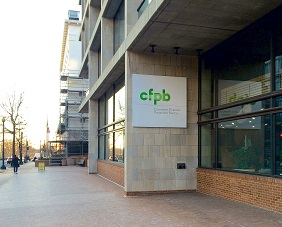Newsroom
NAFCU to CFPB: Adopt viable alternatives to ATR/QM patch
 NAFCU's Kaley Schafer – in response to the CFPB's advance notice of proposed rulemaking to revise the General QM definition in light of the possible Ability to Repay/Qualified Mortgage (QM) patch expiration – urged the CFPB to adopt viable alternatives that allow credit unions "the same protections and benefits, including access to the secondary market, and the ability to provide credit for their members" if the CFPB decides not to extend the patch.
NAFCU's Kaley Schafer – in response to the CFPB's advance notice of proposed rulemaking to revise the General QM definition in light of the possible Ability to Repay/Qualified Mortgage (QM) patch expiration – urged the CFPB to adopt viable alternatives that allow credit unions "the same protections and benefits, including access to the secondary market, and the ability to provide credit for their members" if the CFPB decides not to extend the patch.
Schafer, NAFCU's regulatory affairs counsel, highlighted benefits of the QM patch in providing credit unions with the ability to sell their loans into the secondary market – generating "vital" liquidity enabling credit unions to make more loans to their members.
Schafer also recommended that the CFPB grant an extension of the QM patch "until finalization of any revisions to the General QM definition occur to alleviate market disruptions," and requested revisions to the debt-to-income threshold "that permits flexibility for credit unions while preserving important consumer protections."
Currently, the ATR/QM rule prohibits a creditor from making a mortgage loan unless the creditor makes a reasonable and good-faith determination (based on a set of underwriting standards) that the consumer will have a reasonable ability to repay the loan, including any mortgage-related obligations (such as property taxes).
"The ATR/QM rule is an example of the 'one-size-fits-all' approach to rulemaking that has caused unintended consequences in the mortgage industry," wrote Schafer. "Many of NAFCU's members have decided to extend mortgages only meeting the definition of a General QM, as they are concerned about the ability to sell to the secondary market, and legal and regulatory risks associated with non-QM loans. In addition, there is increased financial risk of non-QM loans.
"Due to decreased marketability of non-QM loans, credit unions must hold these loans on their balance sheets, creating interest rate risk (IRR). IRR is a concern for credit unions, and in order to mitigate this risk they may refrain from originating non-QM loans," she added.
Share This
Related Resources
Add to Calendar 2024-06-26 14:00:00 2024-06-26 14:00:00 Gallagher Executive Compensation and Benefits Survey About the Webinar The webinar will share trends in executive pay increases, annual bonuses, and nonqualified benefit plans. Learn how to use the data charts as well as make this data actionable in order to improve your retention strategy. You’ll hear directly from the survey project manager on how to maximize the data points to gain a competitive edge in the market. Key findings on: Total compensation by asset size Nonqualified benefit plans Bonus targets and metrics Prerequisites Demographics Board expenses Watch On-Demand Web NAFCU digital@nafcu.org America/New_York public
Gallagher Executive Compensation and Benefits Survey
preferred partner
Gallagher
Webinar
AI in Action: Redefining Disaster Preparedness and Financial Security
Strategy
preferred partner
Allied Solutions
Blog Post
Add to Calendar 2024-06-21 09:00:00 2024-06-21 09:00:00 2024 Mid-Year Fraud Review Listen On: Key Takeaways: [01:16] Check fraud continues to be rampant across the country. Card fraud is affecting everyone. [04:31] Counterfeit US passport cards are just another new toolbox in the bad actors’ toolbox. [07:21] Blocking the fallback is the only way to defeat counterfeit cards. [11:17] The best way is constant education to your members in as many channels as you can. [13:02] We are still seeing overdraft lawsuits. Make sure the programming you have at your credit union matches what you have displayed for the members. Web NAFCU digital@nafcu.org America/New_York public
2024 Mid-Year Fraud Review
Strategy & Growth, Consumer Lending
preferred partner
Allied Solutions
Podcast
Get daily updates.
Subscribe to NAFCU today.
